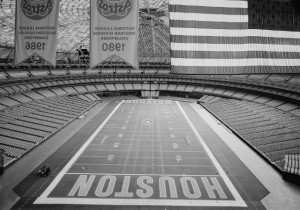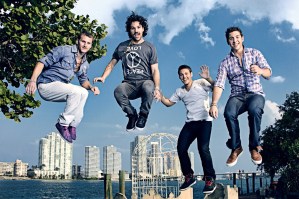Stop It. Just Stop it. The Astrodome had it’s 15 minutes of fame. As glorious as it was, its 15 minutes are up.
Last November, voters defeated a measure that would have used tax payer money to turn the Astrodome into a surely over-the-top visitor center. I mean, come on. It’s Texas. Everything’s bigger in Texas, right? Nonetheless, nothing has been done about the decaying monument. Except for endless talks abut what should be done, instead of what is being done.
Thus, I bring you back to an old article that I wrote last year about the fate of the Astrodome and what its demolition will mean for Houston.
When Aspirations Beat Reality: How Houston Lost the Eighth Wonder of the World

Since 2008, ten sports facilities have opened across the country in 3 of the principal professional sports leagues in the United States. 5 in Major League Baseball (MLB). 2 in the National Basketball Association (NBA). 3 in the National Football League (NFL). The 49ers, Vikings and Falcons are all slated to break ground and christen a new stadium of their own within the next 4 years if all goes according to plan. With innovation and technology developing at the speed of light it seems that keeping up with the revolving door of sports facilities is harder than ever.
Besides a heavy burden on taxpayers, a new stadium can bring about many lucrative deals for not only the team but the city in which it calls home. Sponsorships, naming rights, Superbowl bids, NCAA tournaments and concerts are just a short list of revenue generating possibilities. But what happens when aspirations beat reality? When the pursuit of bigger and better things can leave a city frozen in time? Houston happens. The Astrodome happens.
The Houston Astrodome officially opened its doors in 1965, hailed as a miraculous embodiment of technology and architectural fortitude- literally the first of its kind. Decades removed from its glory days, the astrodome sits empty and used, collecting dust on its 65,000-plus florescent red and orange seats. It’s been more than a decade since its former tenants played their last games. The Houston Oilers last graced the turf of the Astrodome in 1996 and The Astros hit their last homerun in the dome in 1999. Since officially closing in 2008, the fate of the Astrodome is still in question. As a lifelong Houstonian, I can attest that the situation is complicated. Sentiment, history and an obsession with sports is very much at the root of this unpleasant problem as much as money, productivity and the best interest of the city is.
Imploding an old stadium to make room for a new one is not a novel idea. In fact, it’s a best used practice. Yankee Stadium, Giants Stadium, Shea Stadium and Texas Stadium were all demolished to make room for its successor in 2008 alone. In all four cases, the stadiums were demolished no more than 2 years after its closing. Houston has no shortage of sports arenas. The opening of BBVA Compass Stadium (Houston Dynamo) and Constellation Field (Sugarland Skeeters) in 2012 brings Houston to a total of five sports centric complexes. Some would say that we Houstonians have a mild obsession on our hands here. So what’s the appeal in keeping the astrodome intact? It could be the $29 million dollar price tag on imploding it, just to turn it into a 1,600-space parking lot. Or, it could be the possibility of lucrative future endeavors that could be lured to Houston if renovated or converted.
In 2012, Houston played host to the NBA All-Star game and is set to host the NCAA Men’s Final Four at NRG Stadium in 2016. A newly constructed hotel, movie production studio or even a space themed park (which have all been proposed) would certainly add to the dwindling, lack-luster tourist appeal of Houston. But let’s be realistic. Converting a behemoth structure like the Astrodome would cost millions. Harris County still owes $30 million on the Astrodome, which will make it hard to persuade taxpayers to approve any kind of legislation that would require them to pay more for renovation or conversion. Taxpayers are already shoveling out roughly $2 million a year on maintenance and upkeep alone.
Don’t get me wrong, I love the Astrodome, but if you can get a New Yorker to let go of Yankee Stadium………. you can get the city of Houston to let go of the Astrodome. I’m not saying we have to let it go with no fuss. I propose a farewell tour. Offer tours of what’s still intact and aesthetically pleasing. Sell portions of the turf like MLB does, offer commemorative bricks for fans on the grounds of the new lot or even build a commemorative statue.
I’m dying to stand in its center and marvel at what once was. 100% positive that every banner, every seat and every blade of astroturf holds a meaningful memory to many. Standing in the center would be like standing in a time machine. Houston literally frozen in time. However, all nostalgia aside, the bottom line is a decision needs to be made NOW. Putting it off is only shoving us deeper between a rock and a hard place. It’s like ripping off a Band-Aid. Just do it already.


 Small schools don’t lack ideas, they lack personnel.
Small schools don’t lack ideas, they lack personnel.



 The days of yellow jerseys, roses on podiums and yellow wristbands are long gone. The fairy tale of a stage four Cancer survivor who beat the odds to win The Tour de France a record seven times, has rapidly dissipated. A yellow haze has descended upon the world of cycling.
The days of yellow jerseys, roses on podiums and yellow wristbands are long gone. The fairy tale of a stage four Cancer survivor who beat the odds to win The Tour de France a record seven times, has rapidly dissipated. A yellow haze has descended upon the world of cycling.
